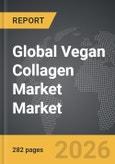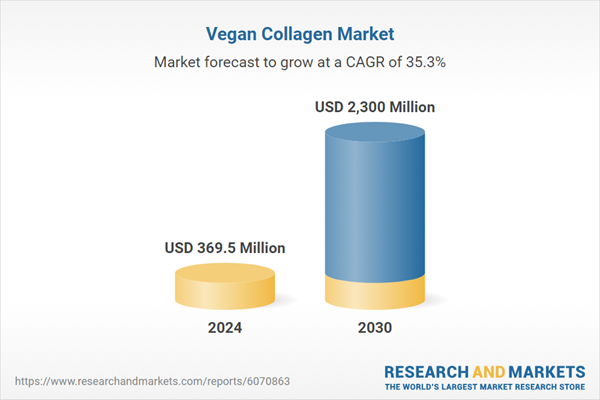Global Vegan Collagen Market - Key Trends & Drivers Summarized
Why Is Vegan Collagen Capturing the Spotlight in Beauty and Wellness Circles?
Vegan collagen has swiftly risen from niche innovation to a major trend in the beauty, wellness, and functional nutrition markets, driven by growing consumer demand for cruelty-free, plant-based, and scientifically backed alternatives to traditional animal-derived collagen. Unlike conventional collagen sourced from bovine, marine, or porcine tissues, vegan collagen is developed through bioengineering processes - often involving genetically modified yeast or bacteria that are programmed to produce human-identical collagen peptides. Some formulations also rely on collagen-boosting botanical ingredients such as vitamin C, silica, amino acids, and antioxidants that support the body's natural collagen synthesis. The surge in popularity is fueled by a combination of factors: the booming plant-based movement, rising awareness around ethical sourcing, and increasing preference for clean-label, sustainable beauty solutions. Consumers are seeking products that align with their values while also delivering visible results in areas like skin elasticity, joint health, hair strength, and nail resilience. With endorsements from influencers, dermatologists, and holistic health practitioners, vegan collagen is being embraced not only in supplements and skincare but also in functional foods and beverages, where it is incorporated into smoothies, protein powders, gummies, and wellness shots. This evolution underscores vegan collagen's emergence as a sophisticated, high-demand solution in modern self-care regimes.How Are Technology and Bioinnovation Powering the Rise of Vegan Collagen?
The rapid development of vegan collagen is a testament to breakthroughs in synthetic biology and precision fermentation, which enable the creation of bio-identical collagen without animal inputs. Biotech companies are leveraging CRISPR and recombinant DNA techniques to instruct microorganisms to produce types I, II, and III collagen - the most abundant types in human skin, bones, and connective tissues. This lab-based collagen is structurally similar to human collagen and can be tailored for targeted applications such as anti-aging, tissue regeneration, or joint support. Moreover, plant-based collagen boosters that stimulate natural production - such as bamboo-derived silica, acerola cherry, amla, and lysine - are being combined with fermented amino acid blends to mimic the functionality of traditional collagen supplements. The technological edge also extends to the encapsulation and delivery systems, with liposomal and nano-formulated vegan collagen offerings gaining traction for their enhanced absorption and bioavailability. These innovations are fueling growth in both oral and topical product categories, expanding the use of vegan collagen into serums, face masks, and even medical-grade formulations. As scientific validation of plant-based and lab-grown collagen alternatives grows, tech-savvy and health-conscious consumers are becoming more confident in their efficacy, leading to wider market penetration and cross-industry adoption.What Role Do Lifestyle Shifts and Clean Beauty Trends Play in Accelerating Adoption?
The surge in demand for vegan collagen is closely tied to broader lifestyle trends emphasizing wellness, sustainability, and ethical consumerism. The clean beauty and holistic health movements have ushered in a new era of ingredient transparency, where consumers actively avoid animal-derived components, allergens, and synthetic additives in their personal care and nutritional products. Millennials and Gen Z, in particular, are seeking multi-functional supplements and skincare products that support long-term health while aligning with their environmental and social values. Vegan collagen caters directly to this ethos, offering a “no compromise” solution that merges beauty, health, and planet-conscious living. It is also gaining traction among fitness enthusiasts, plant-based dieters, and those managing chronic conditions that require anti-inflammatory or allergen-free formulations. Retailers and wellness brands are responding by dedicating shelf space to vegan collagen, both in physical stores and online marketplaces. Influencers, beauty bloggers, and telehealth platforms are helping normalize its use through testimonials, challenges, and educational content. The rise of digital wellness communities has further accelerated word-of-mouth growth, while wellness subscription boxes and influencer-curated bundles are expanding reach. These lifestyle-driven dynamics are transforming vegan collagen from a niche supplement into a cultural staple in the self-care routines of a new generation of consumers.What Are the Key Factors Driving Global Growth in the Vegan Collagen Market?
The growth in the vegan collagen market is driven by several factors directly related to biotech innovation, evolving consumer behavior, expanding product applications, and rising demand for ethical alternatives. One of the primary drivers is the increasing prevalence of plant-based lifestyles and conscious consumerism, where shoppers actively seek out cruelty-free, sustainable products across health, wellness, and beauty categories. The rapid advancement in biotechnology - particularly in fermentation and recombinant protein production - is enabling the scalable and cost-efficient production of high-quality vegan collagen, making it more accessible across global markets. Another major catalyst is the clean beauty movement, which prioritizes ingredient transparency and is fueling demand for topical skincare products free from animal derivatives. The growing popularity of preventative health and functional nutrition is prompting widespread use of vegan collagen in powdered supplements, wellness drinks, and fortified foods. E-commerce platforms and social media have made these products more visible, driving consumer education and trial. Simultaneously, regulatory support for vegan and non-GMO labeling, coupled with expanding distribution networks, is facilitating market entry in regions such as North America, Europe, and Asia-Pacific. Innovation in delivery formats - from capsules and bars to serums and mists - is allowing brands to appeal to a broader range of consumer preferences and health goals. Together, these factors are shaping a high-growth, innovation-driven market where vegan collagen is poised to become a mainstay in the future of ethical wellness and beauty.Report Scope
The report analyzes the Vegan Collagen market, presented in terms of market value (US$). The analysis covers the key segments and geographic regions outlined below:- Segments: Source (Fruit Source, Vegetable Source, Other Sources); End-Use (Food & Beverages, Personal Care & Cosmetics, Healthcare, Other End-Uses).
- Geographic Regions/Countries: World; United States; Canada; Japan; China; Europe (France; Germany; Italy; United Kingdom; Spain; Russia; and Rest of Europe); Asia-Pacific (Australia; India; South Korea; and Rest of Asia-Pacific); Latin America (Argentina; Brazil; Mexico; and Rest of Latin America); Middle East (Iran; Israel; Saudi Arabia; United Arab Emirates; and Rest of Middle East); and Africa.
Key Insights:
- Market Growth: Understand the significant growth trajectory of the Fruit Source segment, which is expected to reach US$1.5 Billion by 2030 with a CAGR of a 38.7%. The Vegetable Source segment is also set to grow at 29.7% CAGR over the analysis period.
- Regional Analysis: Gain insights into the U.S. market, valued at $100.7 Million in 2024, and China, forecasted to grow at an impressive 46.1% CAGR to reach $604.3 Million by 2030. Discover growth trends in other key regions, including Japan, Canada, Germany, and the Asia-Pacific.
Why You Should Buy This Report:
- Detailed Market Analysis: Access a thorough analysis of the Global Vegan Collagen Market, covering all major geographic regions and market segments.
- Competitive Insights: Get an overview of the competitive landscape, including the market presence of major players across different geographies.
- Future Trends and Drivers: Understand the key trends and drivers shaping the future of the Global Vegan Collagen Market.
- Actionable Insights: Benefit from actionable insights that can help you identify new revenue opportunities and make strategic business decisions.
Key Questions Answered:
- How is the Global Vegan Collagen Market expected to evolve by 2030?
- What are the main drivers and restraints affecting the market?
- Which market segments will grow the most over the forecast period?
- How will market shares for different regions and segments change by 2030?
- Who are the leading players in the market, and what are their prospects?
Report Features:
- Comprehensive Market Data: Independent analysis of annual sales and market forecasts in US$ Million from 2024 to 2030.
- In-Depth Regional Analysis: Detailed insights into key markets, including the U.S., China, Japan, Canada, Europe, Asia-Pacific, Latin America, Middle East, and Africa.
- Company Profiles: Coverage of players such as 1NESS, Alpro, Amy's Kitchen, Bute Island Foods, Daiya Foods and more.
- Complimentary Updates: Receive free report updates for one year to keep you informed of the latest market developments.
Some of the 42 companies featured in this Vegan Collagen market report include:
- Andalou Naturals
- Evonik Industries
- Future Kind
- Garden of Life
- Geltor
- Herbaland
- MaryRuth Organics
- Moon Juice
- Pacifica Beauty
- PlantFusion
- Revive Collagen
- Shreddy
- Sunwarrior
- TCI Biotech
- That Hippie Co
- The Outset
- Vedge Nutrition
- VeCollal
- Vital Proteins
- Vitasoy International
This edition integrates the latest global trade and economic shifts into comprehensive market analysis. Key updates include:
- Tariff and Trade Impact: Insights into global tariff negotiations across 180+ countries, with analysis of supply chain turbulence, sourcing disruptions, and geographic realignment. Special focus on 2025 as a pivotal year for trade tensions, including updated perspectives on the Trump-era tariffs.
- Adjusted Forecasts and Analytics: Revised global and regional market forecasts through 2030, incorporating tariff effects, economic uncertainty, and structural changes in globalization. Includes historical analysis from 2015 to 2023.
- Strategic Market Dynamics: Evaluation of revised market prospects, regional outlooks, and key economic indicators such as population and urbanization trends.
- Innovation & Technology Trends: Latest developments in product and process innovation, emerging technologies, and key industry drivers shaping the competitive landscape.
- Competitive Intelligence: Updated global market share estimates for 2025, competitive positioning of major players (Strong/Active/Niche/Trivial), and refined focus on leading global brands and core players.
- Expert Insight & Commentary: Strategic analysis from economists, trade experts, and domain specialists to contextualize market shifts and identify emerging opportunities.
Table of Contents
Companies Mentioned (Partial List)
A selection of companies mentioned in this report includes, but is not limited to:
- Andalou Naturals
- Evonik Industries
- Future Kind
- Garden of Life
- Geltor
- Herbaland
- MaryRuth Organics
- Moon Juice
- Pacifica Beauty
- PlantFusion
- Revive Collagen
- Shreddy
- Sunwarrior
- TCI Biotech
- That Hippie Co
- The Outset
- Vedge Nutrition
- VeCollal
- Vital Proteins
- Vitasoy International
Table Information
| Report Attribute | Details |
|---|---|
| No. of Pages | 282 |
| Published | February 2026 |
| Forecast Period | 2024 - 2030 |
| Estimated Market Value ( USD | $ 369.5 Million |
| Forecasted Market Value ( USD | $ 2300 Million |
| Compound Annual Growth Rate | 35.3% |
| Regions Covered | Global |









